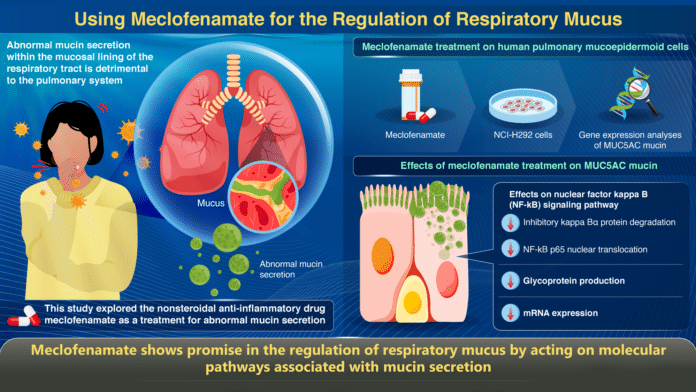The inner lining of our respiratory system is coated with mucus. Several respiratory illnesses can be caused by abnormal mucin secretion. Since many of the medications now used to treat this problem have unneeded side effects. A team of Korean researchers has effectively repurposed the anti-inflammatory medication meclofenamate, giving patients with associated respiratory ailments fresh hope.
In a recent study, a Korean researcher repurposed meclofenamate to understand better how it affected the respiratory mucous. Meclofenamate was previously used as a non-steroidal anti-inflammatory drug to treat several diseases, including parasite infections, prostate cancer, and arthritis. According to researchers, Meclofenamate can now be used to treat aberrant respiratory mucus by regulating mucin secretion.
Dr. Hyun-Jae Lee, an associate professor at Smith Liberal Arts College and Department of Addiction Science, Graduate School, Sahmyook University, and one of the lead researchers exclaims, “Compared to conventional drug development strategies, our strategy of discovering new therapeutic effects from existing drugs saves a lot of time and costs.”
The researchers used the NCI-H292 cell line, which mimicked respiratory cells and secreted mucus with mucins, to evaluate the meclofenamate. They specifically looked at the expression of the MUC5AC gene, which produces crucial mucin. They also looked into the chemical mechanisms through which meclofenamate affected the mucin. Their conclusions were right on target.
Their findings revealed that meclofenamate significantly decreased MUC5AC gene and protein expression. The drug was discovered to accomplish this by influencing the nuclear factor kappa light chain enhancer of activated B (or NF-kB) cell signaling pathway, a biomolecular pathway heavily involved in the immune response; it decreased the degradation of a biomolecular component known as “inhibitory kappa B” and the movement of another such component known as “p65” into the nucleus of the respiratory cells. The main takeaway from these results is that meclofenamate can regulate mucin secretion, which in turn affects the properties of respiratory mucus.
Meclofenamate has emerged as a novel therapeutic agent for abnormal respiratory mucus. These findings serve as a model for future efforts in drug development and research because they not only successfully repurpose an easily accessible and clinically authorized medicine for a new illness condition.
Dr. Lee said, “Discovering the unknown therapeutic effects of existing drugs against different diseases and related symptoms is more promising than de novo drug discovery and development. While the former requires only 3 to 12 years of intense research and investment of resources, the latter requires at least 10 to 17 years.”
Journal Reference:
- Jiho Ryu, Kyung-il Kim, Rajib Hossain, et al. Meclofenamate Suppresses MUC5AC Mucin Gene Expression by Regulating the NF-kB Signaling Pathway in Human Pulmonary Mucoepidermoid NCI-H292 Cells. Biomolecules & Therapeutics. DOI: 10.4062/biomolther.2023.035
